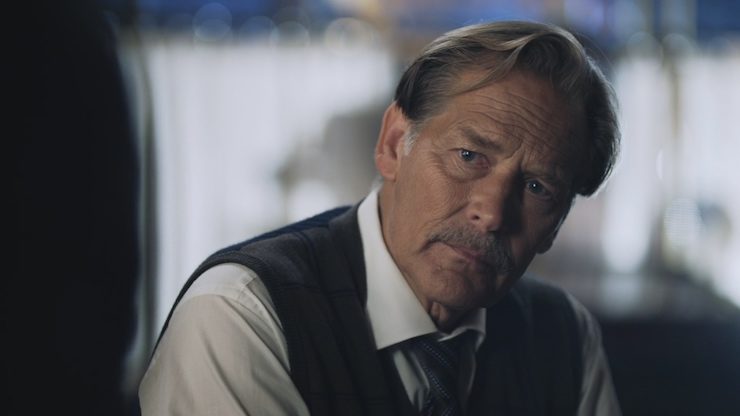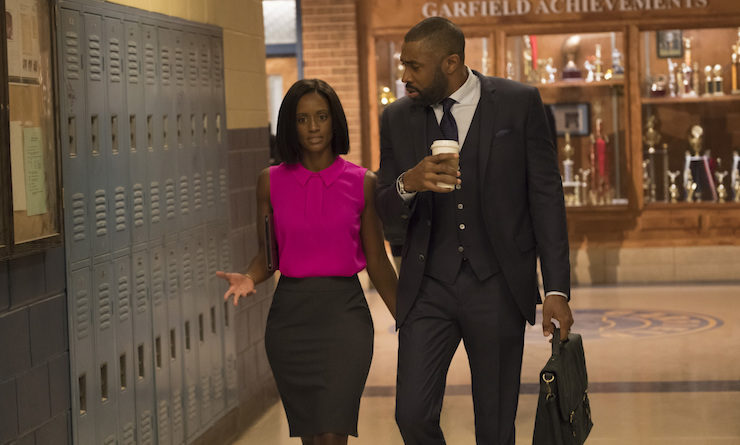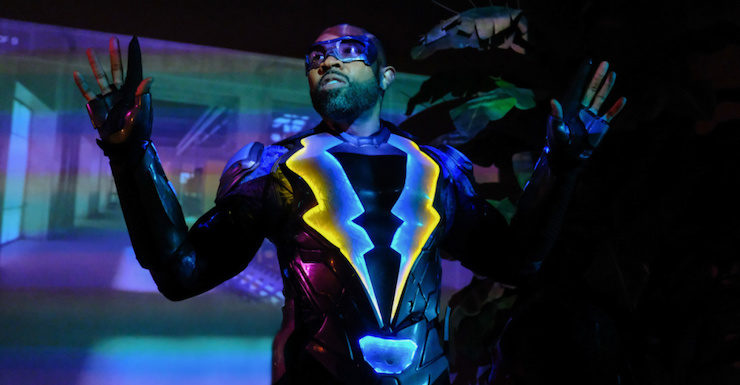The CW’s latest DC Comics series, Black Lightning, has been doing a lot of things really well from the very beginning. With only eight episodes aired to date, it has shown itself to be a very considered character study focused on the additional effort required and the heightened stakes of being a black person with any influence in an urban community. In the process, it has also become not only another media touchstone for black superhero representation but black lesbian superhero representation. It’s also a lot of fun to watch Jefferson Pierce (played by Cress Williams), his daughters Anissa (Nafessa Williams) and Jennifer (China Anne McClain), and his ex-wife Lynn (Christine Adams) being smart, critical, hilarious, and badass in as many scenes as possible.
Moreover, the show is doing an interesting job not being preachy about a reality that tends to take up a bafflingly large amount of real estate in the visual/dramatic imagination of black lives. Even if you love the character, love superhero fiction in general, or just want a fun drama to watch on a Tuesday night, there’s no denying that film and television has already spent a lot of time (for some, perhaps even too much time) retelling the stories of black people in urban American communities struggling in the middle ground between the rock that is hostile law enforcement and the hard place that is gang warfare. It’s familiar territory—regardless, especially in the revealing light of the #BlackLivesMatter movement, if Black Lightning wanted to be preachy, it’d be hard to argue that the sermon would be terribly unwelcome or ill-timed.
Spoilers through season 1, episode 8.
In many significant ways, however, the series is not merely this familiar depiction of the African-American experience with a superhero mixed in—instead, it is an examination of racist superstructure through the lens of the entire superhero genre, down to the secret experiments and clandestine coverups. And the audience is made aware of this truth before even its heroes discover it.
Over several episodes in this first season, we the audience spend a fair amount of time focusing on Peter Gambi (James Remar), Jefferson’s superhero tailor and, essentially, the Alfred Pennyworth to Jefferson’s Bruce Wayne. He is the man who made the suit that channels Black Lightning’s power to a level that won’t destroy Jefferson’s body, the one who taught him how to fight, and the one who helped the superhero remain a secret for as long as possible. It’s in a secret lair beneath his shop that the two make plans for how to protect the streets of Freeland. Gambi is the only regular supporting character, hero or villain, who isn’t black, and while it may appear that he’s playing the role of Jefferson’s master or supervisor, he does spend a lot of time being deferential, supportive, and even worried during their interactions. The show also gives us a lot of time to see Gambi acting on his own, removed from Jefferson’s presence and without his knowledge.

In several of those scenes, we see Gambi literally communicating with the enemy. We learn that the show’s big bad, Tobias Whale (Marvin “Krondon” Jones III) knows where he works, and that Gambi speaks for Black Lightning. We watch him interact with Whale’s criminal superior, the queenpin Lady Eve (Jill Scott), voicing his concerns about the recklessness of their activity in Freeland and reminding her of their silent promise to never harm Black Lightning or his family. He speaks of a relationship with a clandestine organization to which he once belonged, an organization that treats the city and its people like lab rats in a grand experiment in which no single person seems to even know the main purpose or hypothesis. Gambi works in the dead of night to clean up Jefferson’s messes by making bigger ones of his own, until a white man in a suit meets him in the dark in an expensive car, telling him that if Black Lightning doesn’t take it down a notch, they will have to kill him. By the end of episode eight, we learn that “Gambi” is not even his real name.
I suspect the comparisons to real life events here are obvious, even baked into the text of the original comics (which I admit I had unfortunately never heard of, before this series came to television). The whole behind-the-scenes conspiracy reeks of one part COINTELPRO, one part American opioid crisis, and one part Tuskegee syphilis experiments—a shady cluster of culturally and emotionally disconnected white men playing with the lives of black communities, flooding their corners with drugs and messing with the bodies of their children, only to leave these communities to deal with the eventual fallout and observe the negative effects from a distance.
When you get to this point in the story, a show that was already presenting an entertaining but frustrating version of African-American existence becomes an even more unsettling and more overtly political narrative. We already see a lot of Jefferson’s double life and double consciousness in the show—his struggle between using his superpowers to protect his community and stop crime, or doing his best as a high school principal to guide young black lives toward a better path without ever letting a lightning bolt loose. But once you learn that his one ally on the street is on speaking terms with one villain Jefferson didn’t even know was alive and connected to others—an entire organization, it seems, that he isn’t even aware of—these struggles are thrown into increasingly starker focus. We’re seeing an acutely observed examination of how systems of oppression swallow up the lives and work of black revolutionary practice of any kind, forcing the schools to struggle to keep the kids safe and properly educated, forcing those who would fight for a better present and future to question who, if anyone, is on their side.

Once Gambi tells the truth, I couldn’t help but think about how ironically tragic it is that the man with the power to manifest electricity spends so much time in the dark, an instrument in a system that does not want anything to shine in Freeland. Or, put another way, the master’s tools (in this case, the biochemistry that gives Jefferson his extraordinary abilities) still cannot dismantle the master’s drug trade, or the master’s human experimentation.
If it is as purposeful as it appears to be, it’s a more important show than many may realize. Ever so carefully, the series seems to be weaving some of the cruelest ghosts of American history’s treatment of black people into its worldbuilding. The result is the story of a black man with extraordinary powers that are the direct results of torture and manipulation by a shady organization, battling a narcotics trade that those very same people created and funded, and trying to uplift a struggling community with very few resources while under the intense (and often biased) judgment of the media and the law.
It’s hard to imagine the intention isn’t to use the superhero genre to examine the consequences of cruel and unempathetic systems on oppressed and historically disadvantaged communities. Freeland is a microcosm of the struggles black people face in almost any American city. It’s a world where a black man can be the most influential public figure in his area, with the power to harness and control electricity with his body—where he can create literal and figurative light wherever he goes—and still see the bare minimum of change take place in his neighbourhood, no matter how hard he works. It’s a reminder that there is a difference between having powers and power—structural, monolithic, systemic, concentrated power.
This sounds like a really depressing, pessimistic reading of the show, but it isn’t meant to be. If the show continues on this trajectory, it should ultimately end in something inspiring—radical, even. After all, we watch superhero shows to see the heroes defeat evil, and there is nothing more evil than knowing that your world is under the control of people who don’t care about you, who see your body as an experiment, or worse. As we approach the last five episodes of the season, all signs are pointing to the show eventually doing the work to dismantle that control. Gambi has come clean; both of Jefferson’s daughters are aware of their powers, and Anissa has even begun her apprenticeship of sorts; even Lynn, who hates having any of her loved ones involved at all, has been the most instrumental to getting to the bottom of all the lies and disinformation surrounding them.
But to get to this point, Black Lightning has to be honest about that invisible superstructure. Even though it wears the trappings of a primetime CW caped-crusader show, the deployment of these elements cannily paints a picture of how difficult it is for black people to escape, reject, or ultimately fight back against these structures of control. The show is working toward showing us that such difficulty doesn’t make it impossible, and that informed reassurance—that clear-eyed glimpse into the realm of possibility—may be something black TV viewers have sorely needed for some time.
Brandon O’Brien is a performance poet and writer from Trinidad. His work is published or upcoming in Uncanny Magazine, Strange Horizons, Sunvault: Stories of Solarpunk and Eco-Speculation, Arsenika, and New Worlds, Old Ways: Speculative Tales from the Caribbean, among others. He is also the poetry editor of FIYAH Magazine. You can find his blog at therisingtithes.tumblr.com or on Twitter @therisingtithes.










